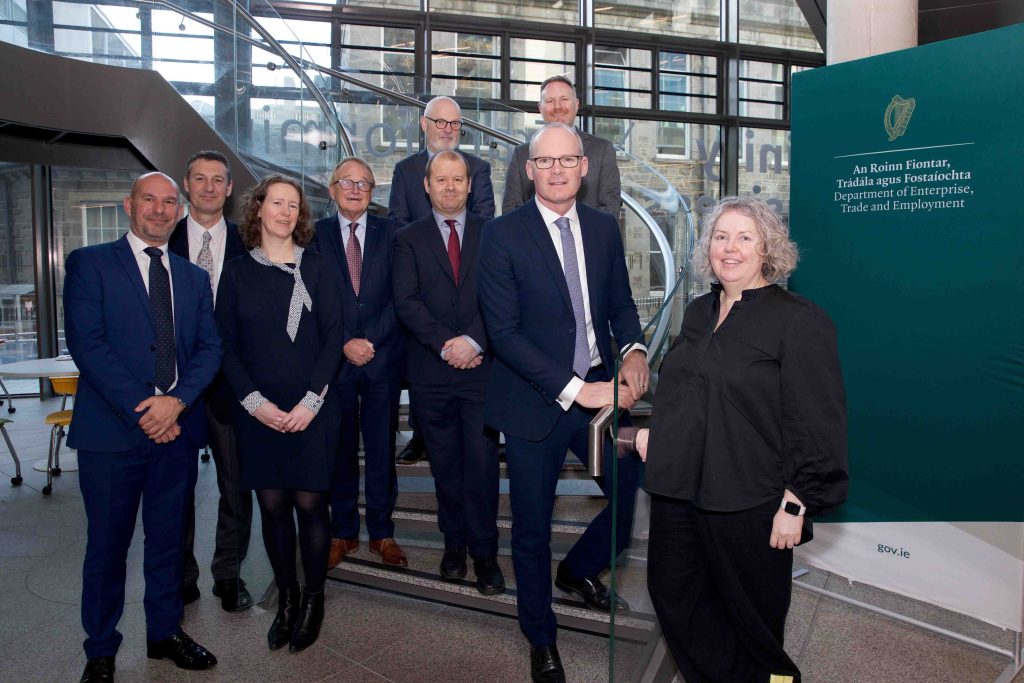“The Irish government has changed policies and incentivised change by providing resources such as funding and land. But the industry as a whole must want to change, and this also means changing culture.”

UK MMC champion and CEO of Cast Consultancy Mark Farmer outlines why clients need to understand the economic fundamentals of off-site manufacturing if they want a sustainable industry to meet their on-site needs. ROBBIE COUSINS reports
In 2016, Mark Farmer, CEO of UK-based specialist construction consultancy Cast, authored the Farmer Review, an influential independent government review of the UK’s construction labour model, which he entitled ‘Modernise or Die’. In 2019, he was appointed the UK government’s Champion for Modern Methods of Construction in Housebuilding.
Farmer is an internationally-respected commentator on construction technology and how MMC, in particular, can significantly improve productivity and reduce carbon emissions. He has also been a regular contributor to the MMC dialogue in Ireland over the past few years.
Mark Farmer – Modernise or die
In his 2016 review of the UK construction industry, Farmer set out what he saw as the obvious steps that the industry needed to take if it was to remain fit for purpose. It was clear to him that one of the biggest threats to the sector was workforce size and demographics. An ageing and much-depleted workforce has since been further impacted by the knock-on impacts of Brexit and Covid-19.
In 2016, Farmer saw a huge productivity challenge coming, and he said that the sector needed to look at alternatives to traditional methods of construction to be able to deliver and achieve levels of efficiency not previously considered possible.
Today, Mark Farmer says that progress has been made, but it has been slow.
“Many things have changed in the UK construction sector since 2016, and they continue to change. But the transition from less efficient traditional construction methods has been a slow journey, which I had anticipated would be the case. It was a huge ask to expect the construction industry to change from its established and embedded building practices, but it became clear in time to the sector that it needed to move to more modern ways of building if it was to be productive and sustainable.
The report received a positive reaction from the UK government and the construction sector.
“Some of my recommendations related to policies and initiatives the government could introduce as a policy maker and as a client of the industry to drive positive change.
“Homebuilding is one area that has benefitted from government programmes. In terms of the actions that have been taken, various initiatives and programmes are now in train, including the UK Affordable Homes Programme 2021-2026, which is linked to the need to use MMC as part of new home building delivery.
“This has been a stimulating activity in the market and has been a catalyst in getting the sector to move to more innovative construction techniques, MMC usage and digital technology,” he adds. “I think what’s really interesting is that the initial period of government-led interventions to try and push the industry to a different place has moved to a new phase where the industry is increasingly recognising the need to be proactive in that transition.
“Irrespective of the government prodding it towards a different place, we now have contractors, house builders and trade subcontractors in the UK addressing the big challenges, particularly around its workforce.”
Covid-19 impacts
The Covid-19 pandemic has also had a significant impact on that journey and was quite a big interruption. Farmer comments that the Covid-19 pandemic resulted in contractors pivoting to more lean practices and rolling out digital construction technologies. Previously bustling sites with trades and construction workers trying to work around each other were replaced with socially-distanced task-at-hand focused operations. Greater efficiency was one of the early gains from the pivot in response to the start of the Covid-19 pandemic.
“In the UK, as in Ireland, we restarted construction quickly with social distancing rules and a new standard operating procedure, and productivity improved.
“Site productivity improved because work was carried out in a more structured, orderly and efficient way. Workers were not crawling all over each other to get in to complete their individual tasks. Better planning and lean became part of the process.
“Unfortunately, post-lockdown, we seem to be back to square one. Evidence suggests that our productivity has tailed off dramatically from where we were pre- Covid. It’s difficult to work out why this is the case. But anecdotal evidence suggests that construction has a bigger productivity issue now. We need to look at this to regain momentum, otherwise, the efficiencies temporarily gained during the pandemic will become wasted opportunities.”

Irish construction sector
Irish construction has also been going through a metamorphosis in recent years, with the Construction Sector Group’s Innovation and Digital Adoption SubGroup bringing together stakeholders from private and public sectors to transform Ireland’s construction sector into a modern, efficient and sustainable industry.
Mark Farmer has been a regular visitor to Ireland since the publication of his UK review and is very much aware of how the sector is tackling the challenge.
Most recently, in February, he attended a forum of industry stakeholders where he had the opportunity to speak with Enterprise Minister Simon Coveney.
“I have been collaborating with the Irish construction sector for the past five or so years and have spoken at a number of conferences, and I value the links I have made.
“Recently, I was at a stakeholder event in Trinity College that looked at how the Housing for All plan can be mobilised through a different approach to housing delivery. I had the pleasure of meeting Minster Coveney, and we discussed the importance of reforming and modernising home-building delivery in the face of the challenges that Ireland is facing. The challenges are very similar to those being faced by the UK sector in relation to workforce productivity, efficiency and quality issues, and, of course, reducing carbon.
Farmer notes that the Irish government has been very proactive by consulting with the sector on what needs to happen and setting out long terms plans such as Project Ireland 2040 and Housing for All. It has also been supportive in incentivising the sector to modernise.
“The Irish government has changed policies and incentivised change by providing resources such as funding and land. But the industry as a whole must want to change, and this also means changing culture.
“From what I have seen, many developers and contractors are making decisions for their own businesses’ health to pivot towards more modern, innovative construction techniques. But they also need to bring their subcontractors along with them and recognise that if they are using MMC, offsite factories require upfront funding and pipeline surety in order to be viable.
“Government programmes such as Project Ireland 2040 and Housing for All show the Irish government’s determination to drive change, and the industry is also starting to make progress in working through the challenges.”
MMC business operational models
Mark Farmer says that vertically integrated delivery is the most insulated business model for an MMC manufacturer. “A developer with land and planning permission has the building and selling/renting element of their business in-house.
“The next stage of taking more control of the business is moving from building to manufacturing the product, creating an end-to-end process. When the developer or builder decides to manufacture their buildings, they are effectively taking a vertically integrated approach, whereby they can also control the quality of production, reduce embodied and operational carbon and align what is required to the end customer.”
He continues, “A manufacturer who sells their product to a third-party house builder, developer or housing association bears the risk of being a commoditised transaction and may not know where the next job is coming from or at what price. Survival and maturing as a business is about resiliency.
“If a manufacturing business is not part of a vertically integrated chain, they are by necessity marketing and selling their product externally. The best strategy in this scenario is to have a diverse client base with as many clients as possible, preferably with some being counter-cyclical.
“Some manufacturers work across different sectors, such as housing, education, health, etc. This is particularly popular with modular manufacturers whose product is adaptable if economies of scale can be reached. This can be a very resilient business if a good client base is in place.”
He adds that manufacturers can often also provide a rental offer, which ensures there is cash generation in the business. “This has been working particularly well in the UK in the education and health sectors, where rented units garner a monthly income for manufacturers.
“The vertically integrated model, in my experience, tends to be the most resilient, and most successful businesses to date tend to be SMEs, not mega-factories. Larger plants are cash hungry and must produce thousands of units to survive. There is a role for this centrally-industrialised model in the housebuilding market, but we are not yet at that level of acceptance and maturity, so we need alternative pathways as well.”
Hybrid operation models
Whatever form of MMC is incorporated into a project, there will always be a need for some level of traditional building activity on site, particularly where panels, pods and component sub-assemblies are being brought to site.
Mark Farmer explains, “MMC is nuanced in that there is a hybrid element to it where factory production and traditional building are combined. Panels, pods, and component subassemblies are delivered to site, construction workers prepare the site, install them and build traditionally around them. There will always be some level of modern and traditional crossover.”
Farmer sees a gradual move towards what he calls “pre-manufactured value (PMV). This is the financial proportion of a construction project’s gross construction cost derived through pre-manufacturing.
His consultancy, Cast, has pioneered the use of PMV as a key industry metric for measuring progress towards modernisation. The use of a PMV proxy measure enables construction project teams to adapt designs, supply chain, logistics and site-based construction and assembly choices to deliver improvements against the following criteria:
- Predictability of outcome
- Productivity improvement and waste reduction
- Quality & performance
- On-site delivery speed and site overheads
- Transactional costs
- Community disruption
- Site health and safety risk.
He comments that PMV is a strong proxy for multiple industry performance measures, and its use in early target setting and gauging projects is a vital element of driving behavioural change, albeit it should be used alongside more qualitative measures for the best effect.
Understanding MMC investment
Expanding on the establishment of a sustainable MMC sector, Mark Farmer says that clients need to understand that, unlike traditional construction methods, manufacturing plants have upfront costs and need pipeline security to invest in production.
“There are a lot of challenges entering the construction market with a different approach to how you physically design and build your product. The construction industry is notoriously traditional, and anyone doing anything different is up against it.
“Manufacturing models need upfront investment. They need equity or access to funding, which is not always easy, particularly for an SME.
“It is critically important to think about the execution and delivery model. The significant bit in all of this is that you can have a good plan on paper, but I’ve seen many businesses fail because they have a poorly-executed business plan in practice. Either the business model linked to demand has been wrong, or the physical product hasn’t been good enough.
“Then, you have to combine manufacturing technologies and plant and equipment with people. To this end, we have a whole new part of our industry that has not existed up to now. We have had trades – bricklayers, carpenters, electricians, plumbers, and the like. However, apprenticeship models for hybrid trade/manufacturing skills and for outright manufacturing technicians or construction and assembly technicians is a new idea, and governments have a role to play in supporting the creation of these new apprenticeship streams. These apprenticeships then need to give people real qualifications recognised industry-wide so that they can move jobs.
“The employment model for manufacturing is also different to traditional construction. Traditional construction is very much self-employment-led. It’s all about casual labour. To run a factory, you need to have permanently employed staff that are properly trained and have good working conditions. To attract the right people, you must create a better working environment and offer better packages and security.
“Anyone starting out in an MMC business has to think about their workforce. Where are you going to get it from? How are you going to train it? How are you going to keep it? How are you going to attract others to come to your business? And, ultimately, how will you physically manufacture products in a way that is to a quality level that the clients want?
“It’s all common sense, but you’d be surprised how many people don’t think through some of those common steps, those basic steps to running a business. But there are examples of people who have cracked and continue to crack the MMC nut. So it’s not impossible.”
Next steps
So back to the challenge at hand as Mark Farmer sees it for the construction industry to modernise or die.
“I have travelled a lot over the past few years and observed the appetite for change in construction industries across the world. I have been working with various parties in Ireland and am aware of all the plans and initiatives in place to change how things are done.
“Forward-looking construction sectors are looking to evolve. Ireland has been very innovative in its approach to addressing the challenge, changing house-building and other construction models and developing more integrated supply chain arrangements. Combine this with the government’s interest and desire to change how things are built, particularly in relation to Housing for All, and I think there is a real willingness to do things differently.
“It doesn’t mean the challenges will disappear because they won’t, or that the government can’t do more because it can. But no one wants to repeat the mistakes of the past. Ireland has gone through a lot of boom-and-bust cycles over the years. The Celtic Tiger experience damaged the property and construction sector, and there has been a real appetite to repair the industry long-term so it can provide proper sustainable, high-quality jobs for people, better wages, better productivity and ultimately cheaper but high-quality buildings. This will benefit everyone economically, and I sense that Ireland is an exciting hotbed of thinking on the subject at this time,” Mark Farmer concludes.




